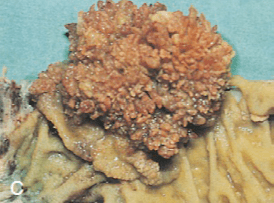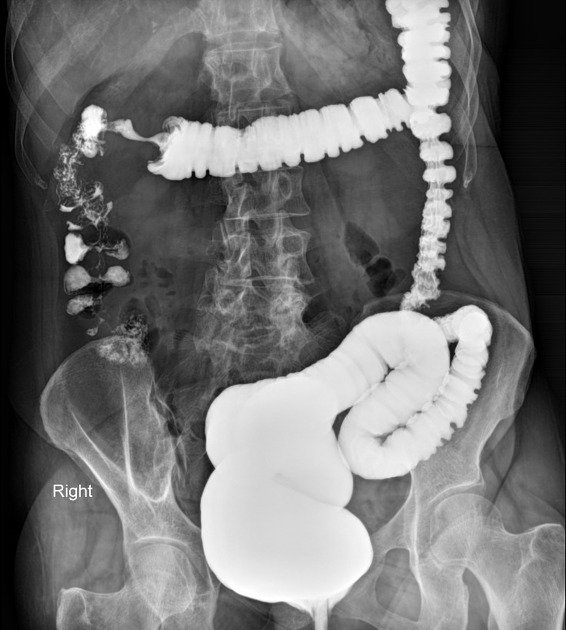Colorectal Cancer
content of this page
1- Introduction
2- Pathophysiology
3- Symptoms
4- Treatment
Introduction
Colorectal cancer is a type of cancer that begins in the colon or rectum, parts of the digestive system. It typically starts as small, noncancerous clumps of cells called polyps that form on the inner lining of the colon or rectum. Over time, some of these polyps can become cancerous. Colorectal cancer is one of the most common cancers and can affect both men and women. Risk factors include age, family history, certain genetic mutations, a diet high in red or processed meats, smoking, and a sedentary lifestyle.

Pathophysiology
The pathophysiology of colorectal cancer involves a series of genetic and molecular changes that transform normal epithelial cells lining the colon and rectum into malignant cancer cells. This process typically begins with the formation of benign adenomatous polyps, which can arise due to mutations in key regulatory genes such as APC (adenomatous polyposis coli), KRAS, and TP53. These mutations disrupt normal cell growth and division, leading to uncontrolled proliferation. As polyps grow, they can acquire additional genetic alterations that further drive their progression to malignancy. For example, mutations in the TP53 gene, which normally functions as a tumor suppressor, can lead to a loss of cell cycle control and increased genomic instability. Additionally, changes in the DNA mismatch repair system can result in microsatellite instability, contributing to further genetic errors. Environmental factors, such as diet, lifestyle, and chronic inflammation, also play a role in promoting these genetic changes. Over time, the accumulation of these genetic and epigenetic alterations causes the cells to become increasingly abnormal, invade surrounding tissues, and eventually metastasize to distant organs, characterizing the advanced stages of colorectal cancer. Early detection and removal of polyps can significantly reduce the risk of progression to invasive cancer.

Symptoms
Changes in Bowel Habits:
- Persistent diarrhea or constipation.
- A feeling that the bowel does not empty completely.
- Narrow stools or a change in the shape of the stool.
Blood in the Stool:
- Bright red or very dark blood mixed with the stool.
- Rectal bleeding.
Abdominal Discomfort:
- Cramping, pain, or bloating.
- A feeling of fullness or distension.
Unexplained Weight Loss:
- Significant weight loss without a known reason.
Fatigue and Weakness:
- Persistent tiredness or a feeling of weakness.
- Anemia caused by chronic blood loss.
Other Gastrointestinal Symptoms:
- Nausea or vomiting.
- Gas pain or discomfort.
General Health Changes:
- A noticeable decline in overall health.
- Appetite loss.
Treatment
1. Surgery
- Polypectomy and Local Excision: For very early stages, small polyps or localized tumors can be removed during a colonoscopy.
- Colectomy: Partial or total removal of the colon may be necessary for larger tumors. This can be done through traditional open surgery or laparoscopically.
- Proctectomy: Removal of part or all of the rectum, sometimes followed by colostomy or ileostomy.
2. Radiation Therapy
- External Beam Radiation: High-energy rays are directed at the cancer from outside the body to kill cancer cells or shrink tumors.
- Internal Radiation (Brachytherapy): Radioactive material is placed inside or near the tumor.
3. Chemotherapy
- Systemic Chemotherapy: Drugs are given orally or intravenously to kill cancer cells throughout the body.
- Regional Chemotherapy: Drugs are delivered directly to the area where the cancer is located.
4. Targeted Therapy
- Monoclonal Antibodies: Drugs like bevacizumab (Avastin) or cetuximab (Erbitux) target specific molecules involved in cancer growth.
- Kinase Inhibitors: Drugs like regorafenib (Stivarga) block enzymes that promote cancer cell growth.
5. Immunotherapy
- Checkpoint Inhibitors: Drugs such as pembrolizumab (Keytruda) and nivolumab (Opdivo) help the immune system recognize and attack cancer cells.
6. Palliative Care
- Symptom Management: For advanced cancer, treatment focuses on relieving symptoms and improving quality of life.
- Pain Relief: Medications and other interventions to manage pain.
7. Clinical Trials
- Experimental Treatments: Participation in clinical trials may provide access to new therapies under investigation.
8. Lifestyle and Supportive Care
- Nutrition and Diet: Specialized dietary plans to support health and recovery.
- Psychological Support: Counseling and support groups to help cope with the emotional impact of cancer.